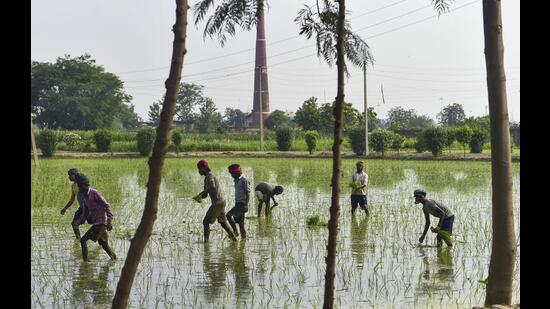Tags
Punjab: Slow paddy sowing worries PAU, asks growers to speed up process
By Gurpreet Singh Nibber.
Paddy transplantation in Punjab has been completed on just 35% of the total area expected to be cultivated this kharif season, prompting concerns from the state’s agricultural experts.

Chandigarh: Paddy transplantation in Punjab has been completed on just 35% of the total area expected to be cultivated this kharif season, prompting concerns from the state’s agricultural experts.
The Punjab Agricultural University (PAU), Ludhiana, has urged farmers to accelerate transplantation as the ideal window for short-duration varieties closes by July 10.
“According to the information gathered by the university authorities, farmers have delayed transplantation despite the state government having allowed it from June 1,” said Dr SS Gosal, vice chancellor of PAU.
The university has sold 23,000 quintals of short-duration paddy seeds, sufficient to cover around 3 lakh acres of land, he added. The university is advising farmers to complete transplantation by mid-July to better conserve water while maintaining crop productivity.
This year, paddy cultivation is expected to cover 31 lakh hectares (approximately 76 lakh acres) in Punjab, with a significant target of 7 lakh hectares (17 lakh acres) allocated for the premium aromatic basmati variety, comprising 22% of the total area. However, the delay in transplantation has raised alarm, especially with the monsoon season approaching.
Early transplantation controversy and delays
The state government had allowed paddy transplantation to begin as early as June 1, despite opposition from agricultural scientists and petitions against the decision in the National Green Tribunal (NGT). The government’s decision was based on the notion of advancing the sowing schedule to coincide with the expected rainfall. Direct seeding of rice (DSR) was also permitted from May 15, but farmers have not fully adhered to the schedule.
The transplantation was staggered across various regions, with the government allowing it to start on June 1 for Faridkot, Bathinda, Ferozepur, Muktsar and Fazilka. For Gurdaspur, Pathankot, Amritsar and other districts, it started on June 5 and June 9, respectively. However, despite the early start, the pace of transplantation remains slow.
Environmental concerns, groundwater depletion
Agriculture experts, including Dr SS Johl, Dr GS Khush, Dr Rattan Lal and Dr B S Dhillon, have criticised the early transplantation schedule. They warn that sowing crops during peak rainfall months could lead to increased water usage, worsening Punjab’s already critical groundwater depletion.
“The early sowing of paddy could lead to excessive water consumption, especially during the peak season when the demand for irrigation is at its highest,” said Dr SS Gossal, vice chancellor of the PAU. He emphasized that late transplantation, extending into mid-July, could help conserve water while still ensuring satisfactory crop yields.
The state’s groundwater reserves are under severe strain, with the water table declining by nearly one metre annually. The National Institute of Hydrology has raised alarms, warning that continued depletion could eventually transform Punjab into a desert.
PUSA 44 dilemma
Further complicating matters is the rising preference among farmers for long-duration varieties like PUSA 44, which require more water to grow. While the state has banned the use of this variety due to its high water consumption and tendency to produce higher crop residue, farmers continue to procure PUSA 44 seeds from neighboring Haryana and Rajasthan.
Dr Gurdev Singh Khush, a World Food Prize laureate and rice-breeding expert, warned that the PUSA 44 variety, though yielding more rice, consumes 20% more water and leads to a higher volume of crop residue — a factor contributing to the increase in farm fires. Despite the state’s ban on its sale, the absence of enforcement mechanisms has left the situation largely unchecked.
Efforts to mitigate water crisis
In response to the worsening groundwater crisis, the Punjab government had hoped that advancing transplantation would coincide with the monsoon rains, thereby reducing irrigation needs. However, the delay in transplantation and the increased water demand due to the choice of crop varieties are complicating the state’s efforts to manage its water resources.
Punjab’s 14.5 lakh irrigation tubewells remain critical for crop survival, especially during the dry pre-monsoon months. Experts warn that without immediate measures to conserve water, the state’s agricultural viability could be under severe threat in the near future.
Despite the environmental concerns, paddy cultivation remains a major agricultural activity in Punjab due to the assured procurement system under the Minimum Support Price (MSP). The MSP for paddy is set at ₹2,320 per quintal, providing a safety net for farmers. However, with water becoming an increasingly scarce resource, experts continue to push for short-duration varieties that require less water.
https://www.hindustantimes.com/cities/chandigarh-news/punjab-slow-paddy-sowing-worries-pau-asks-growers-to-speed-up-process-101750446294709.htmlPublished Date: June 21, 2025






